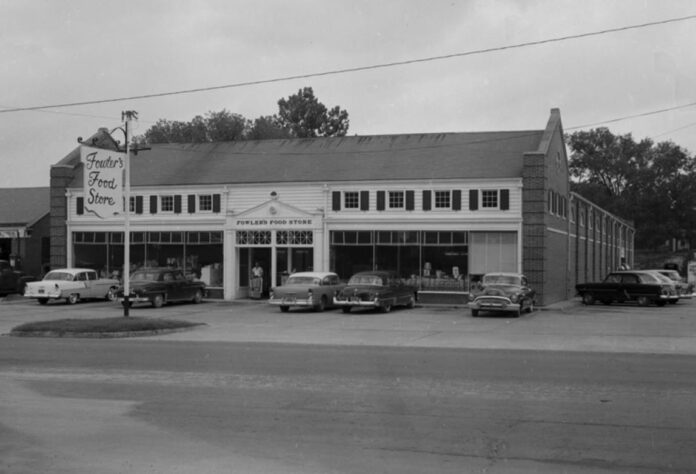
In 1942, the Fowler family founded Fowler’s Food Store at 306 W. Franklin Street. After its relocation in the late 1970s, the storefront was divided between small, locally owned businesses that rotated in and out for years—including restaurants The Purple Bowl, Chimney, Blue Dogwood Public Market and Bella Nails. Now, these businesses face threats of deposition by the Town of Chapel Hill and Longfellow Real Estate.
Since its opening in 2017, The Purple Bowl has been a staple of Franklin Street—an eatery that emphasizes local community with a side of acai and avocado toast. The idea for the restaurant came to the owners, the Gilland family, following a trip to California, where they first fell in love with acai bowls. Paula Gilland and her son Taylor, a Chapel Hill High School alumnus, decided to open an acai restaurant to Chapel Hill and soon landed the space at 306 W. Franklin Street.
When the space housing The Purple Bowl, Chimney, Bella Nail Bar and Blue Dogwood went on the market in 2022, the Gillands attempted to buy the entire building themselves. In the end, the space was sold to Longfellow Real Estate Partners, the largest privately owned life science developer in the United States. In October, the Boston-based company announced its plans to construct a wet lab and office facility in the space.
The Purple Bowl garnered community support when Longfellow’s plans were initially announced. The business posted to Instagram informing followers of its plan to combat the proposal, earning over 3,600 likes and an array of supporting comments. The restaurant’s Change.org petition garnered 526 signatures, and the Town Council email inbox received dozens of messages concerning the future of the space.
Sebastian Mateu, a UNC-Chapel Hill student, even directed a video entitled “Let’s Save Purple Bowl,” featuring students and athletes arguing on behalf of the business. Town Hall meetings have additionally seen an uptick in attendees defending The Purple Bowl’s right to the building.
“It’s a great, local and healthy option, and it has a great sense of community,” senior Aarya Potti, a regular at The Purple Bowl, said. “Everyone there is so kind, and they partner with a bunch of other local businesses.”
The Purple Bowl collaborates with local suppliers such as Ninth Street Bakery, Big Spoon Roasters, Counter Culture Coffee and more. The business also hires Gigi’s Playhouse: a Raleigh-based organization that aims to find employment for people with Down Syndrome.
“We really like where we are,” Paula said in an interview with Chapelboro. “We don’t want to move at all.”
The Town and real estate company alike suggested that Purple Bowl move into the ground floor retail space of the complex, yet construction on the project is expected to take several years to complete. Taylor Gilland also denies any financial incentives or relocation aid from the Town or Longfellow.
“As much as the town has said that they’re helping us, they’ve offered us [nothing],” Taylor Gilland said. “There has been no offer, at least as a buyout clause. It’s $60,000 to a million dollars to open a restaurant, so it’s nothing compared to what Longfellow costs. We’ve had nothing offered from the town or from Longfellow, despite them saying otherwise.”
The Town has provided incentives for businesses to expand in Chapel Hill in the past, most notably Grubb Properties’ acquisition of 137 E. Franklin Street, 136 E. Rosemary Street and Porthole Alley in 2021 and property near Glen Lennox currently being developed into the Link Apartments Calyx. Matt Gladdek, the executive director of the Chapel Hill Downtown Partnership, said that Well Dot, a health technology firm, received state economic grants to develop on Franklin Street in 2019.
“Over the last ten years in particular, Franklin Street has been really getting redeveloped,” Taylor Gilland said. “We’ve got this incredible college town charm that other towns would die for. We have these old brick buildings, locally owned restaurants, retail and all the rest. I just feel like we’re throwing it away with big redevelopments.”
Chapel Hill mayor Pam Hemminger has defended the development of the office space by collaborating with UNC Chancellor Kevin Guskiewicz to strengthen the town’s innovation district, create more year-round jobs, improve infrastructure, and “create a new space for world-changing research.”
Many Triangle residents have urged the Town to find a middle ground. Melody Kramer and Stephen Whitlow of the Triangle Blog Blog have advocated for finding a new space for the labs or for the Town to pay for the relocation of the local businesses.
Blue Dogwood Public Market, a shared-use commercial food hall, takes a different stance on the Longfellow developments in their complex.
Blue Dogwood is used as a 24-hour rentable food hall, where vendors regularly rotate. The vendors pay rent monthly, granting them more fluidity than other businesses within 306 W Franklin.
“Our business model has flexibility by the nature of how we structured it,” Sarah Boak, partner and consultant for Blue Dogwood, said. “Day-to-day it doesn’t affect us as much. As for the long term, we understand that, at some point, there’s going to be development. New landlords have been pretty receptive to us. It’s just kind of the nature of the beast.”
Boak is a Chapel Hill-native, having attended both Chapel Hill and East Chapel Hill High Schools and residing downtown to this day. While appreciating the history behind the older buildings of downtown Chapel Hill, she also weighs the costs of maintenance and energy efficiency of a building constructed in 1948.
“I think that [Longfellow] is doing the right things in the development world,” Boak said. “If we’re going to go the development direction, I would love it if there’s more green space, affordable rent and more walkable, accessible spaces that I feel like downtown Chapel Hill is missing. Development is coming either way, we just want to make sure it’s positive.”
Boak also cited Strong Towns, a non-profit organization that attempts to embrace development in small- to mid sized-towns while emphasizing “Smart Growth”—growth targeted to benefit the community and its members.
Hemminger prioritized downtown revitalization in both her 2015 and 2019 campaigns. According to the Town’s Development Activity Map, there are 44 special projects undergoing permitting and construction, ten development applications under review and 13 outlined concept plans awaiting approval.
Overall, the 306 W Franklin development poses a nuanced challenge for the Town of Chapel Hill in its attempts to revitalize the downtown area while maintaining its small-town quirks.











